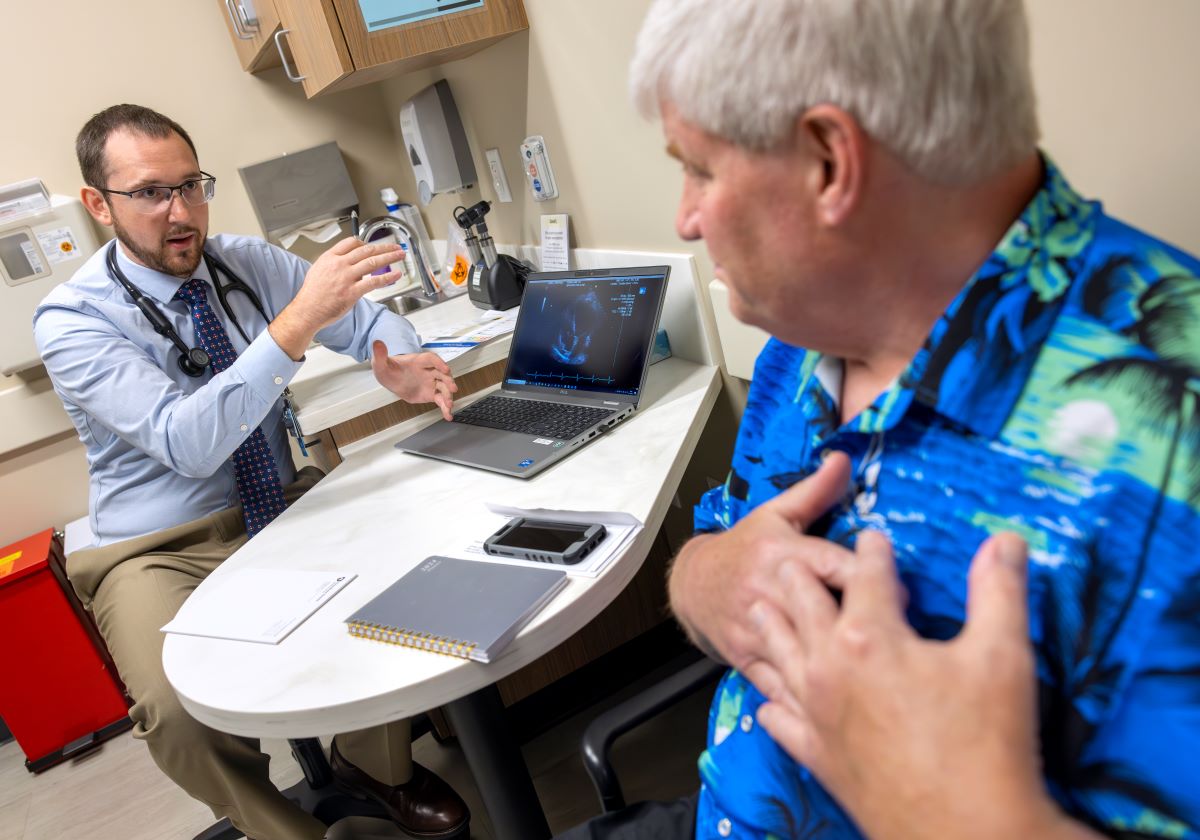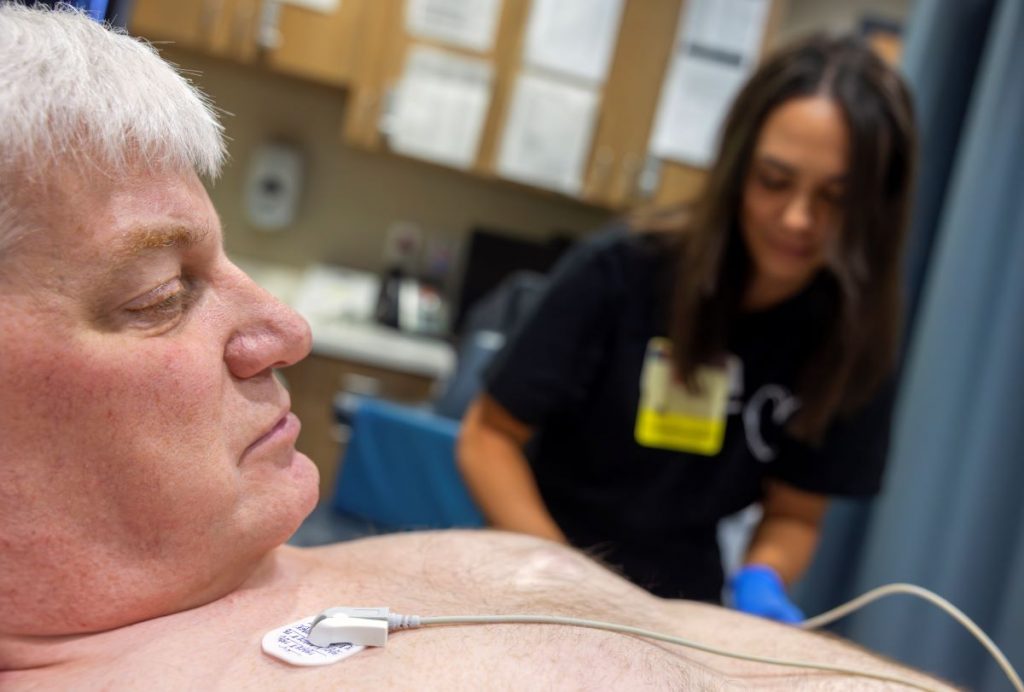Lancaster man’s life transformed by new heart failure program at Penn State Health Lime Spring Outpatient Center

John Jones has never been one to seek out medical attention. So, when on a Sunday in April he told his partner, Glynda Moore, that he needed to go to the hospital, she wasted no time rushing him to Penn State Health Lancaster Medical Center in East Hempfield Township.
“He blacked out briefly at home, and then he passed out three more times on the way to the hospital,” Moore recounted. “We were just lucky to get him there in time.”
Jones went into cardiac arrest, and doctors used an automated external defibrillator to revive him. After more than a month in the hospital, Jones, 59, of Lancaster, was discharged and became one of the first patients in a new Heart Failure Program at Penn State Health Lime Spring Outpatient Center in Lancaster. The program helps stabilize patients and teach them the lifestyle changes needed to improve their health and quality of life.
From intensive care to recovery
An interventional cardiologist implanted an Impella heart pump to help Jones’ failing heart and stents to increase blood flow to the heart muscle. He then was flown to Penn State Health Milton S. Hershey Medical Center, where he spent four 1/2 weeks in the Heart and Vascular Critical Care Unit as doctors worked to wean him off the heart pump and stabilize his condition.
Finally, Jones was discharged and placed under the care of Tyler J. Thomas, a certified registered nurse practitioner with Milton S. Hershey Medical Center’s Advanced Heart Failure and Mechanical Circulatory Support Team. Thomas also sees patients in the Heart Failure Program at Lime Spring Outpatient Center, which began in May.
“We’re expanding cardiac care across Lancaster County to better serve patients living nearby,” said Dr. Steven Ettinger, vice president and physician leader of Penn State Health Heart and Vascular Services. “We want to offer care that’s convenient for all our patients.”
A new approach to heart failure care
Heart failure is a growing problem in the U.S. Nearly 6.7 million adults 20 years old or older have the condition, according to the Centers for Disease Control and Prevention. Heart failure was responsible for nearly 14% of all causes of death in 2022. Studies have shown that heart failure patients who receive education about their conditions fare significantly better than those who do not.
The Heart Failure Program at Lime Spring Outpatient Center offers specialized care for those recently diagnosed with congestive heart failure disease and those with worsening conditions that have become difficult to manage and required hospitalization. Patients can be referred or contact the program on their own.
Focusing on education, medication management and lifestyle modifications, the program operates in conjunction with other cardiology services at Lime Spring Outpatient Center.
Thomas said the goal is to stabilize patients and improve their condition before referring them back to their primary care provider, cardiologist or other specialists.
Personalized cardiac care
Jones was prescribed guideline-directed medical therapy, which uses four different classes of drugs. Thomas works closely with him to adjust his medications, optimizing their effectiveness and minimizing side effects.
“Mr. Jones is doing well,” Thomas said. “I’ve increased his medications to the maximum doses he can tolerate without severe side effects.”
Jones said he and his partner also are benefiting from the educational component of the program. Thomas talked to him about adopting a heart-healthy diet and encouraged him to lose weight.
“Glynda cleaned out all our kitchen cabinets, and we’re eating differently than we used to,” said Jones, who has lost nearly 50 pounds since he was admitted to Milton S. Hershey Medical Center. “I’m a label reader now.”
Hoping to return to his job as a warehouse worker soon, Jones regularly monitors his weight, heart rate and blood pressure. He also started a cardiac rehabilitation program that includes aerobic activity and weightlifting.
“Cardiac rehab is great for heart failure patients because it gives them confidence to exercise while being closely monitored by a team specialized in improving cardiac and physical endurance,” Thomas said.
Jones attends three sessions of rehab each week and closely follows Thomas’ advice and instructions.
“I really appreciate him and all he’s done for me,” Jones said of Thomas. “He’s very considerate in listening to me and letting me rant a little bit sometimes.”
Moore agreed, calling Thomas “a caring person.”
“He doesn’t just treat the condition, he treats the patient,” she said. “He understands that each patient is different.”
Jones gets prepared for an echocardiogram by cardiac sonographer Emily Kreider.
Empowering self-care
Thomas expects to follow Jones for approximately 12 weeks before referring him to a cardiologist at a location of his choice. Currently, cardiologists see patients at Lime Spring Outpatient Center; Lancaster Medical Center; Penn State Health Medical Group – Cornerstone in Lititz; and Penn State Health Medical Group – Millersville.
If Jones’ condition would worsen at some point, he could be referred back to the Advanced Heart Failure Program or to other services at Milton S. Hershey Medical Center, known for its pioneering heart and vascular services.
“My goal is to partner with patients and empower them to optimize their care to help improve their outcomes,” Thomas said.
For now, Jones is happy to be getting all the care he needs—close to home.
“This program has been wonderful,” he said. “It’s so convenient, and I’ve gotten excellent care. I give Penn State Health the credit for me just being here today.”
If you're having trouble accessing this content, or would like it in another format, please email Penn State Health Marketing & Communications.

